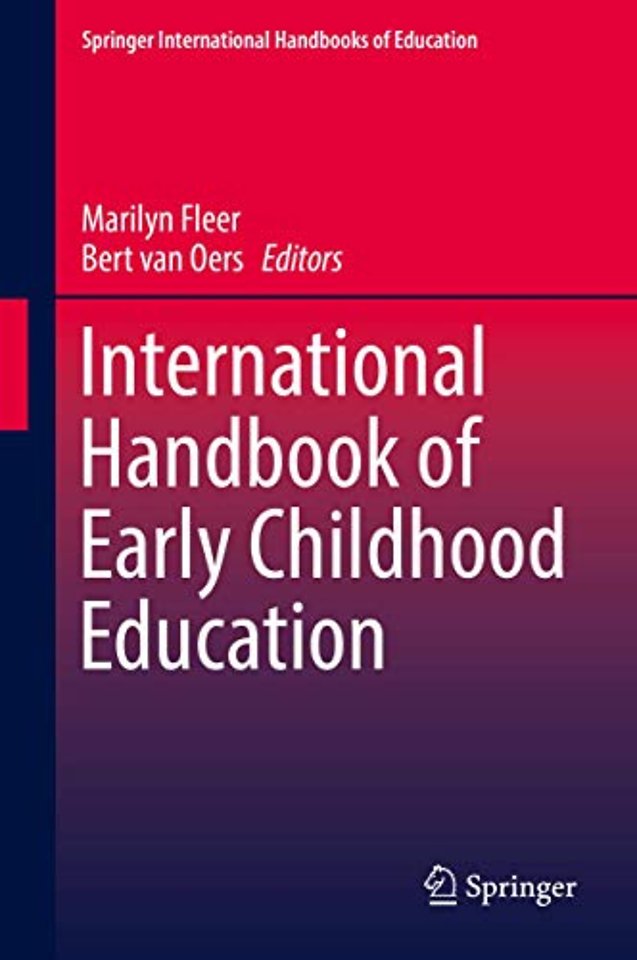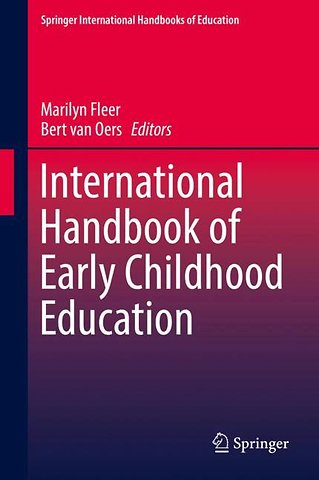International Handbook of Early Childhood Education
Samenvatting
This international handbook gives a comprehensive overview of findings from longstanding and contemporary research, theory, and practices in early childhood education in the Northern and Southern hemispheres. The first volume of the handbook addresses theory, methodology, and the research activities and research needs of particular regions. The second volume examines in detail innovations and longstanding programs, curriculum and assessment, and conceptions and research into child, family and communities.
The two volumes of this handbook address the current theory, methodologies and research needs of specific countries and provide insight into existing global similarities in early childhood practices. By paying special attention to what is happening in the larger world contexts, the volumes provide a representative overview of early childhood education practices and research, and redress the current North-South imbalance of published work on the subject.
Specificaties
Inhoudsopgave
<p>Volume 2</p><p>47. New directions in early childhood education practice: international developments and practice gaps; Marilyn Fleer, Feiyan Chen and Bert van Oers.- Section 4: Innovative and Longstanding Programs.- 48. Longstanding and innovative programs in early childhood education: an introduction; Bert van Oers.- 49. Piramide; I.G.M. Koerhuis, M. Boontje, H. van Boxtel, D. Breebaart and M. op den Kamp.- 50. The ‘Golden Key’ program, and its cultural-historical basis; Gennady Kravtsov and Elena Kravtsova.- 51. The program of developmental (narrative) play pedagogy; Pentti Hakkarainen1 and Milda Bredikyte.- 52. The key to learning curriculum; Nikolay Veraksa and Galina Dolya.- 53. Te Whāriki; Ken Blaiklock.- 54. Tools of the mind: a Vygotskian early childhood curriculum; Elena Bodrova1 and Deborah J. Leong.- 55. Developmental Education for young children in the Netherlands: Basic Development; Bea Pompert and Marjolein Dobber.- Section 5: Curriculum and Assessment.- 56. Introduction to the theme of early childhood curriculum and assessment; Geerdina van der Aalsvoort.- 57. Curriculum and assessment in Brazilian early childhood education; Maria Malta Campos.- 58. Review and reflection on the curriculum reform of early childhood education in China; Jiaxiong Zhu and Jie Zhang.- 59. Constructing early childhood curriculum and assessing young children in Israel’s mosaic of cultures; David Brody.- 60. Recent developments in curriculum and assessment in the early years in Australia; Susan Grieshaber.- 61. Supporting the application of playful learning and playful pedagogies in the early years curriculum through observation, interpretation and reflection; Pat Broadhead.- 62. Making the case for playful learning; Hande Ilgaz, Brenna Hassinger-Das, Kathy Hirsch-Pasek and Roberta Michnick Golinkof.- 63. Children’s perspective to curriculum work: meaningful moments in Finnish early childhood education; Lasse Lipponen, Kristiina Kumpulainen and Maiju Paananen.- 64. Assessing young children’s learning and behavior in the classroom; a complexity approach; HenderienSteenbeek and Paul van Geert.- 65. Conclusions and discussion; Geerdina van der Aalsvoort.- Section 6: Pedagogies in early childhood education.- 66. Pedagogies in early childhood education; Niklas Pramling and Ingrid Pramling Samuelsson.- 67. F.A.W. Fröbel 1782–1852; Jan-Erik Johansson<sup>.- </sup>68. Educational tenets of the Highscope curriculum; Ann S. Epstein and Lawrence J. Schweinhart.- 69. Developmentally appropriate practice in the 21<sup>st</sup> century; Kay Sanders and Flora Farago.- 70. The Waldorf kindergarten; Sara Frödén and Moira von Wright.- 71. Developing the ability of children to use and construct visual models; Nikolay Veraksa and Aleksander Veraksa.- 72. Montessori education; Christina Gustafsson<sup>.- </sup>73. Pedagogy has children’s voice - the educational experience of the Reggio Emilia municipal infant-toddler centres and preschools; Claudia Giudici and Paola Cagliari<.- Section 7: Child, Families and Communities.- 74. Introducing reflections; Charlotte Højholt.- 75. Sharing early care: learning from practitioners; Agnes Andenæs and Hanne Haavind.- 76. Children, families, and communities in Brazil: a cultural-ecological approach to child-rearing values and practices; Jonathan R. H. Tudge, Gabriela D. F. Martins, Elisa A. Merçon-Vargas, Letícia L. Dellazzana-Zanon, Cesar A. Piccinini and Lia Freitas.- 77. Children’s cultural learning in everyday family life exemplified at the dinner setting; Mariane Hedegaard.- 78. Domesticating markets: early-years education and middle-class parenting in India; Henrike Donner.- 79. Creatively enhancing community transformation through work with children and families; Fernanda Coelho Liberali and Alzira Shimoura.- 80. Children participating and developing agency in and across various social practices; Charlotte Højholt and Dorte Kousholt.- 81. Towards a posthuman developmental psychology of child, families and communities; Erica Burman.</p>
Net verschenen
Rubrieken
- aanbestedingsrecht
- aansprakelijkheids- en verzekeringsrecht
- accountancy
- algemeen juridisch
- arbeidsrecht
- bank- en effectenrecht
- bestuursrecht
- bouwrecht
- burgerlijk recht en procesrecht
- europees-internationaal recht
- fiscaal recht
- gezondheidsrecht
- insolventierecht
- intellectuele eigendom en ict-recht
- management
- mens en maatschappij
- milieu- en omgevingsrecht
- notarieel recht
- ondernemingsrecht
- pensioenrecht
- personen- en familierecht
- sociale zekerheidsrecht
- staatsrecht
- strafrecht en criminologie
- vastgoed- en huurrecht
- vreemdelingenrecht

